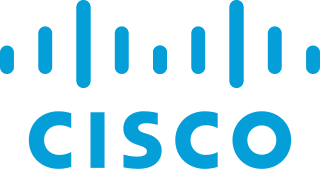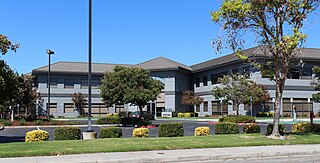
Cisco Systems, Inc. is an American multinational digital communications technology conglomerate corporation headquartered in San Jose, California. Cisco develops, manufactures, and sells networking hardware, software, telecommunications equipment and other high-technology services and products. Cisco specializes in specific tech markets, such as the Internet of things (IoT), domain security, videoconferencing, and energy management with leading products including Webex, OpenDNS, Jabber, Duo Security, Silicon One, and Jasper.

VMware LLC is an American cloud computing and virtualization technology company headquartered in Palo Alto, California. VMware was the first commercially successful company to virtualize the x86 architecture.
Applied Micro Circuits Corporation was a fabless semiconductor company designing network and embedded Power ISA, and server processor ARM, optical transport and storage products.
Fuseproject is an industrial design and branding firm. Founded in 1999 by designer Yves Béhar, the company works across an array of industries including beauty and fashion, furniture, and technology, and is based in San Francisco and New York City.

Overengineering is the act of designing a product or providing a solution to a problem that is complicated in a way that provides no value or could have been designed to be simpler.

Accel, formerly known as Accel Partners, is an American venture capital firm. Accel works with startups in seed, early and growth-stage investments. The company has offices in Palo Alto, California and San Francisco, California, with additional operating funds in London, India and China.

SoundHound AI, Inc. is a voice AI and speech recognition company founded in 2005. It develops speech recognition, natural language understanding, sound recognition and search technologies. Its featured products include a voice AI developer platform, SoundHound Chat AI, a voice-enabled digital assistant, and music recognition mobile app SoundHound. Key vertical industries include the automotive, IoT devices, restaurant and customer service industries. The company’s headquarters are in Santa Clara, California.

Atlassian Corporation is an Australian-American software company that develops products for software developers, and project managers among other groups. The company is domiciled in Delaware, with global headquarters in Sydney, Australia, and US headquarters in San Francisco.

Mellanox Technologies Ltd. was an Israeli-American multinational supplier of computer networking products based on InfiniBand and Ethernet technology. Mellanox offered adapters, switches, software, cables and silicon for markets including high-performance computing, data centers, cloud computing, computer data storage and financial services.

Silicon Valley Bank (SVB) is a commercial bank division of First Citizens BancShares. The bank was previously the primary subsidiary of SVB Financial Group, a publicly traded bank holding company that had offices in 15 U.S. states and over a dozen international jurisdictions.
eDreams is an online travel agency based in Barcelona, Spain, that offers deals in regular and charter flights, low-cost airlines, hotels, car rentals, dynamic packages, holiday packages and travel insurance.

Medallia is an American customer and employee experience management company based in San Francisco, California.
Theranos Inc. was an American privately held corporation that was touted as a breakthrough health technology company. Founded in 2003 by then 19-year-old Elizabeth Holmes, Theranos raised more than US$700 million from venture capitalists and private investors, resulting in a $10 billion valuation at its peak in 2013 and 2014. The company claimed that it had devised blood tests that required very small amounts of blood and that could be performed rapidly and accurately, all using compact automated devices that the company had developed. These claims were proven to be false.
Circle is a peer-to-peer payments technology company that now manages stablecoin USDC, a cryptocurrency the value of which is pegged to the U.S. dollar. It was founded by Jeremy Allaire and Sean Neville in October 2013. Circle is headquartered in Boston, Massachusetts. USDC, the second largest stablecoin worldwide, is designed to hold at or near a stable price of $1. The majority of its stablecoin collateral is held in short-term U.S. government securities.

Elizabeth Anne Holmes is an American biotechnology entrepreneur who was convicted of fraud in connection to her blood-testing company, Theranos. The company's valuation soared after it claimed to have revolutionized blood testing by developing methods that needed only very small volumes of blood, such as from a fingerprick. In 2015, Forbes had named Holmes the youngest and wealthiest self-made female billionaire in the United States on the basis of a $9-billion valuation of her company. In the following year, as revelations of fraud about Theranos's claims began to surface, Forbes revised its estimate of Holmes's net worth to zero, and Fortune named her in its feature article on "The World's 19 Most Disappointing Leaders".

Magic Leap, Inc. is an American technology company that released a head-mounted augmented reality display, called Magic Leap One, which superimposes 3D computer-generated imagery over real world objects. It is attempting to construct a light-field chip using silicon photonics.
Revolut is a global neobank and financial technology company with headquarters in London, UK that offers banking services for retail customers and businesses. It was founded in 2015 by Nikolay Storonsky and Vlad Yatsenko. It offers products including banking services, currency exchange, debit and credit cards, virtual cards, Apple Pay, interest-bearing "vaults", personal loans and BNPL, stock trading, crypto, commodities, human resources and other services.

Dip & Squeeze is the brand name of a type of packaging for tomato ketchup used by Heinz Tomato Ketchup. The product was announced in 2010 and rolled out to consumers at U.S. fast food restaurants in March 2011. Later in 2011 it was sold directly to retail consumers at Target and Wal-Mart.

Letstrack is a technology company that develops GPS tracking applications based in Gurugram, India. As of 2019, the app was available in India and Sri Lanka.














